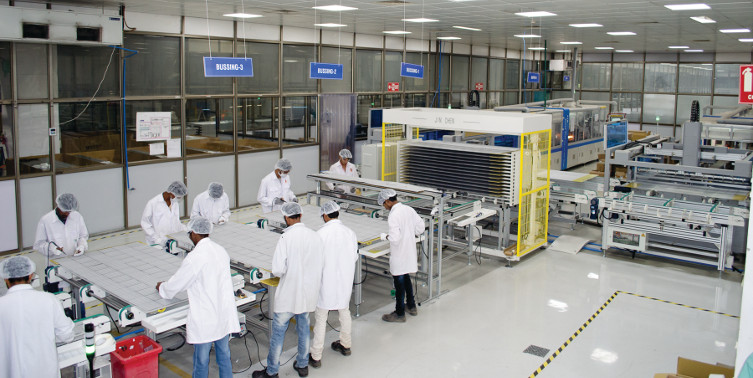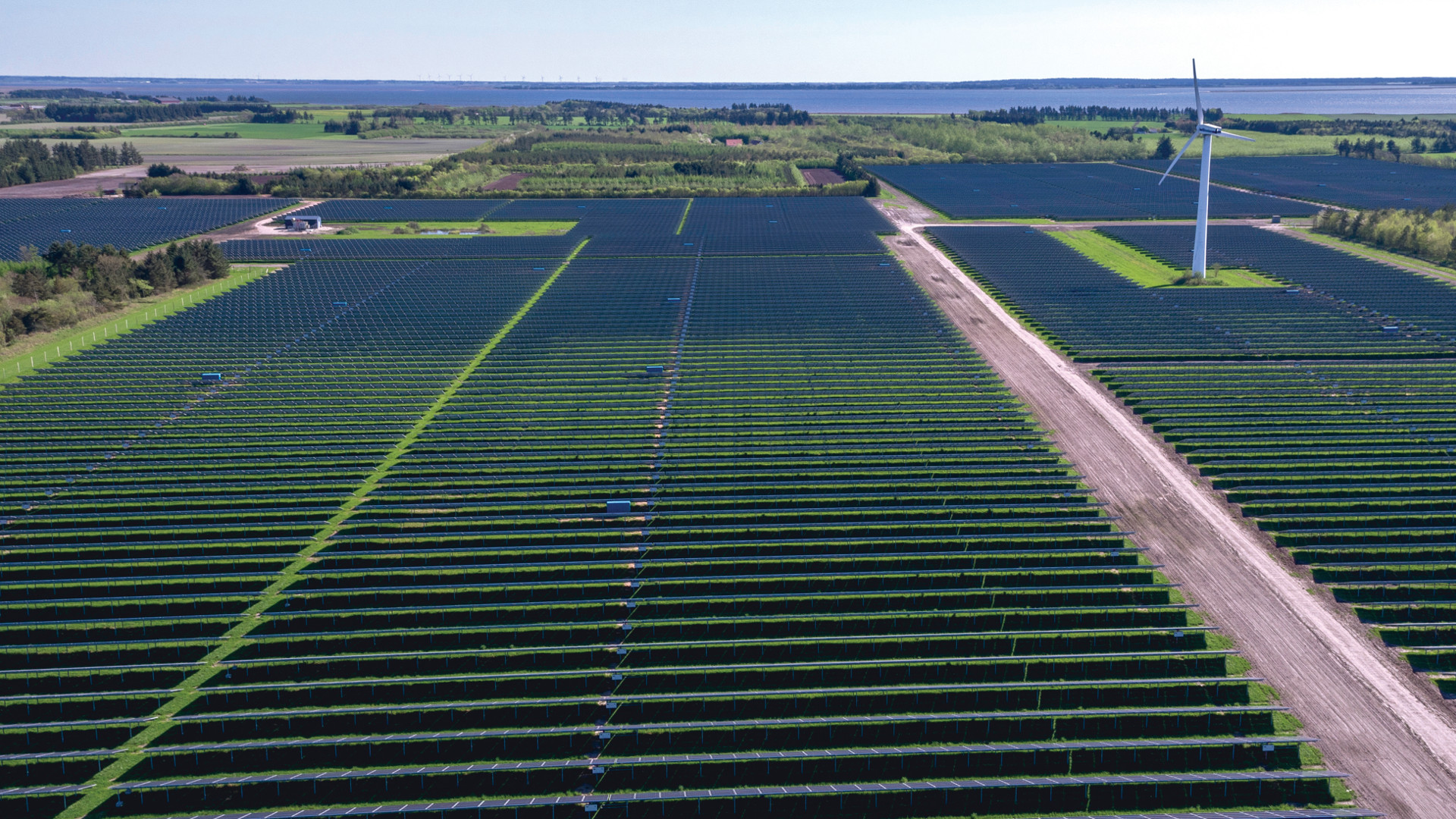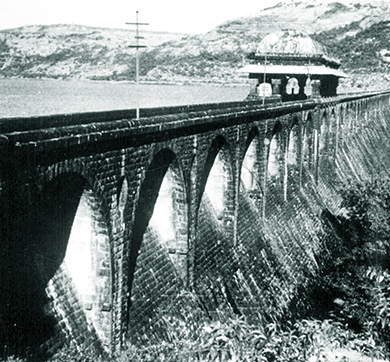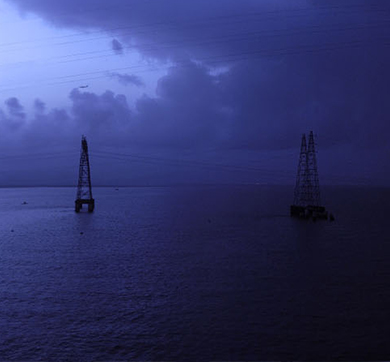March 2019 | 1570 words | 6-minute read
With distributed forms of energy such as solar power receiving a tremendous impetus, following the Government of India’s target to install 175 gigawatt (GW) of renewable energy — out of which 100GW would come from solar power — by 2022, Tata Power Solar Systems Ltd (TPSSL) is now offering residential rooftop solutions in 100 Indian cities.
“We are creating awareness of rooftop solar in the residential space by showcasing the savings achieved and offering project financing, in association with Tata Capital Cleantech, as a part of, or as an extension to, home loans,” says TPSSL managing director, Ashish Khanna.
Besides, the company — formerly Tata BP Solar and one of India’s oldest solar manufacturer — has a portfolio of 2.4GW of solar power, and 1GW of solar projects in the pipeline in the utility-scale segment.
“The company has virtually grown four times in the last four years,” says Mr Khanna. Considered the leader in engineering, procurement and construction (EPC) for large utility-scale and rooftop projects, today, it has also been named the biggest rooftop player in the Indian solar market.

He attributes the company’s profitability to four key differentiators, namely technology and innovation, quality service offerings, customer centricity and commitment of the workforce to provide top-notch solutions.
An Audacious Goal
Until 2013, TPSSL had largely been a manufacturing company that also offered lighting and thermal solutions. The company decided to close these businesses and realign its focus on the EPC business where it had built strong competencies.
“We realised we needed to get into a business that was scalable and would ensure profitability. A business where we would be playing on our strengths rather than just trying to counter the competition of commodity. We assessed our value proposition and its impact on forthcoming business opportunities,” says Mr Khanna.
Consequently, the organisation structure was realigned to reflect a higher degree of agility and value engineering so that projects could be completed on time. Business was divided into three verticals catering to the B2C and B2B segments: large utility-scale projects; rooftops, including residential and commercial; and solar pumps for the agricultural segment.
Meanwhile, the company continues to manufacture modules at its plant in Bengaluru, where it has an annual manufacturing capacity of 300 megawatts (MW) of solar cells and 400MW of modules. The latter are not only exported outside the country but also used in the company’s EPC, roofing and solar pumps. Last year alone, TPSSL exported 200 crore worth of modules.
Mr Khanna says, “Our home-grown competencies helped us to execute our first project in about 18 months. Today, we take less than 6 months to execute a project. Technology and automation have enabled us to be nimbler in one year, allowing us to save our working capital and use the same team to work on two projects. The agility lowers our costs, since 86 percent of these large projects consist of the cost of goods and services.”
The Tech Advantage
Advancements in technology have also entrenched TPSSL at the forefront of new power generation, especially solar.
“The enhanced technology in the solar sector (resulting in lower cost of solar panels) and increase in efficiency (rate at which sunlight hitting the panels is turned into usable energy) is generating tremendous optimism,” says Mr Khanna, adding, “TPSSL has embarked on a slew of ambitious actions to fulfil its part in this goal.”
For instance, drones help the company to survey rooftops in search of minute cracks that are not visible to the naked eye, and to rectify them; this technology-assisted capability is invaluable both at rooftops and on ground-mounted solar assets. A software developed in-house enables the company to process the bill of materials using basic parameters like solar potential, rooftop contours, and so on, recorded by the drones. With the aid of technology, the requirements gathering is completed in a few hours, thereby saving hundreds of person-hours.
The company’s network operations centre in Bengaluru remotely monitors and maintains the quality of every project on a 24x7 basis. Besides, mobile apps enable customers to monitor project performance. The development of a forecasting technique and a forecasting centre, which is in progress, will bring further advantages to the company and its customers.
Even though technology enhanced the scale of operations, the company had to deal with certain challenges. The sourcing of suitable land was one such challenge as the EPC business is land-intensive, requiring about 4 acres of land per megawatt. Also, the land needs to be non-agricultural, with the guarantee of solar resource to make the process cost effective.
Additionally, the solar power business is dependent on regulations that are outside the company’s control. Further, issues like attrition and retention have to be dealt with. TPSSL meets these challenges by building on its technology and engineering capabilities, and by relentlessly driving customer satisfaction. It also strives to limit cost overheads, says Mr Khanna.
Finding Solutions
- Tata Power Solar currently promotes residential rooftop across India to make people aware of its long term benefits. Already present in Delhi, Mumbai, Ajmer, Ahmedabad, Jamshedpur, Dhanbad, Hyderabad, Bengaluru, Chennai, Pune, Nagpur, Guwahati, Chandigarh, Cochin and Varanasi, TPSSL will cover 100 cities by 2019
- Annual saving of up to Rs. 50,000 for 25 years
- Tata Power Solar’s residential rooftop solution decreases use of diesel generators, leading to more fuel savings
- Consumers can avail a chance to earn from their idle rooftop space, the proposition comes with government subsidy
- The company has a robust 150+ sales and service channel partners across India
- 10 – 12 sq m area is required for 1KW capacity solar system
Hall Of Fame
TPSSL has executed several projects across the country in record time
- Completed the 100MW solar power plant, under the domestic content requirement category, for National Thermal Power Corporation in Anantapur, Andhra Pradesh. The project was delivered three months ahead of schedule
- Installed the world’s largest rooftop solar plant in India at the RSSB Educational and Environmental Society, Punjab. The 12MW rooftop EPC project was completed within five months in accordance with the highest quality and safety parameters
- Constructed the largest solar carport at Kochi airport, India, with a total installed capacity of 2.68MW
- Installed an 865kW rooftop solar plant at the Brabourne cricket stadium in Mumbai which was completed in 100 days. The plant is expected to generate over 1.12 million units of electricity per year, leading to 25 percent of savings in the cost of power consumption
- Commissioned India’s largest vertical solar farm for Dell India at Bengaluru. Several innovative measures were deployed to integrate the solar panels into the building’s façade without marring the aesthetics
- Installed a solar carport on the rooftop of a 70,000sq m mall in New Delhi. The solar carport is estimated to set off 438 tonnes of carbon emission annually
Choosing People First
While TPSSL buttressed its value proposition by offering quality products, world-class customised solutions and extensive customer support, it also took special efforts to upgrade its employees’ skills.
It was still early days for the renewable energy industry, when TPSSL entered the segment, which gave them the ease to upgrade their people’s skills without the pressure of having to hit the ground running. Mr Khanna says, “No one likes to work for an organisation that is in the red. Employees feel motivated when they believe that the work that they are doing is impacting the organisation positively.”
The results became evident quickly as TPSSL grew in size and scope. The company’s operating profit (EBITDA) increased from 9.5 million in FY15 to 2,598 million in FY18. Employee engagement scores also displayed an upward swing, rising from 48 percent to 73 percent.
The concern for people is not restricted to employees alone. At project sites, the company offers contract workers temporary housing facilities, drinking water from an RO plant powered by solar power.
Since solar sites are set up in places with maximum radiation and harsh temperatures, the company offers workers glucose water. TPSSL also wires up the plant to ensure workers’ safety and incentivises them to adopt safe work practices. This ensures that TPSSL is the partner of choice, and projects no longer face delays on account of the scarcity of labour.
The Way Forward
Today TPSSL is the preferred contractor for developers like NTPC, Aditya Birla Group and Ayana among others.
Mr Khanna is extremely bullish about the solar industry, and its potential for growth in a nation where nearly 250 million people are not connected to the grid, while an equally large number receive erratic power. With the government’s announcement of a subsidy for 12GW of projects, which requires deployment of indigenous modules, the country seems poised to reap the benefits, and TPSSL is eager to play its part in this transformational journey.
Mr Khanna says, “Every employee in TPSSL is feeling a sense of optimism at the opportunities that have now become available to us. We remain sensitive to the risks inherent in our business without losing our drive to do more. This turnaround in our business will always be one of the most cherished moments of my career. The quality of the work we do today will be our legacy to the nation and epitomise the values of the Tata group.”
—Cynthia Rodrigues








